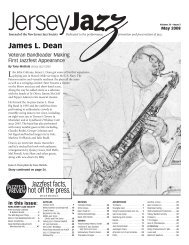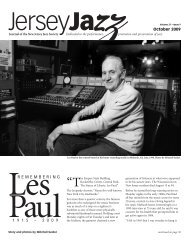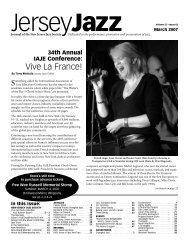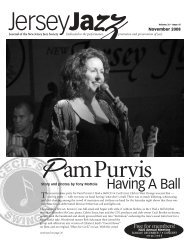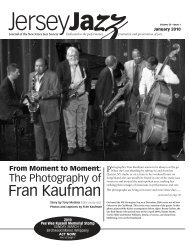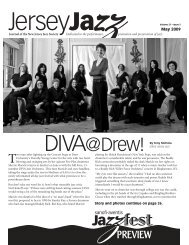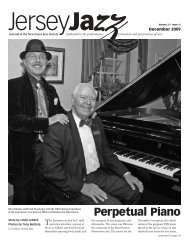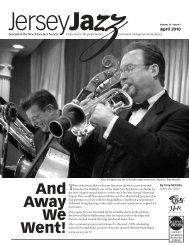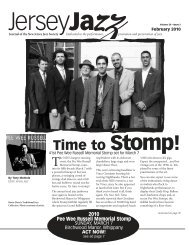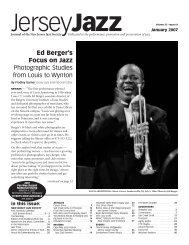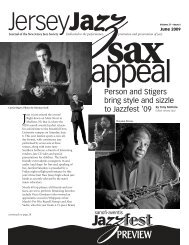<strong>New</strong> <strong>Jersey</strong><strong>Jazz</strong><strong>Society</strong>Notes from <strong>the</strong> Music CommitteeBy Joe Lang NJJS Music Committee Chair■ Well, ano<strong>the</strong>r Pee Wee Russell MemorialStomp has happened, and I’m sure it was aball for all who attended. I am assuming abit here, as I am writing this column inadvance of <strong>the</strong> actual event, but all signspoint to a great afternoon.■ We had a wonderful Member Meeting atTrumpets on February 12. Will Friedwaldgave us a fascinating look at Frank Sinatrawith both his commentary, and a videocompilation of Sinatra performances. Theinteraction between Will and those in attendancewas ongoing and interesting. OurMarch 18 meeting with Bob Porter will havetaken place by <strong>the</strong> time you read this, but Ihope that you make plans to attend <strong>the</strong>April 22 meeting. Since April is <strong>Jazz</strong> AppreciationMonth, we decided to use this meetingto explore <strong>the</strong> various ways that ourmembers have come to appreciate jazz. Weshall have a panel of four or five NJJS Boardmembers who will facilitate an interactiveprogram between <strong>the</strong> panel and <strong>the</strong> o<strong>the</strong>rattendees. Each of <strong>the</strong> panel members willdiscuss how <strong>the</strong>y became attracted to <strong>the</strong>music that we love, and will bring somerecorded examples of selections that wereparticularly meaningful to <strong>the</strong>m in <strong>the</strong>irdevelopment as jazz enthusiasts. Membersof <strong>the</strong> audience will be invited to <strong>off</strong>er questionsand comments. The format of <strong>the</strong>program will be ra<strong>the</strong>r loosely structured toallow for participation by as many people aspossible. Given <strong>the</strong> wide variety of ages,backgrounds and tastes among our members,we expect some lively discussions totake place. So far, each of <strong>the</strong>se MemberMeetings has been interesting and wellreceived by those who have attended. This isa relatively new activity for NJJS, and westrongly believe that it is a benefit of membershipthat should be enjoyed by all of ourmembers. The meetings at Trumpets <strong>Jazz</strong>Club in Montclair are free to members withguests being welcomed for a fee of $10,applicable to a membership should <strong>the</strong> guestopt to join NJJS. There is a social hour from2:00–3:00 PM, and <strong>the</strong> program takes placebetween 3:00 PM and 5:00 PM.■ Our o<strong>the</strong>r April activities include ourco-sponsorship of <strong>the</strong> Frank Sinatra Jr.concert at Rutgers–<strong>New</strong>Brunswick on April 10, andour April 15 Warren Vachéconcert at <strong>the</strong> CommunityTheatre in Morristown.Following are <strong>the</strong> words I wroteabout <strong>the</strong>se events last month.Please plan on being at <strong>the</strong> CommunityTheatre in Morristown on Sunday afternoonApril 15 at 3 PM for <strong>the</strong> next NJJS-producedevent, a performance by <strong>the</strong> Warren VachéQuintet. Joining Warren for this two-hourconcert will be John Allred on trombone,Vinnie Corrao on guitar, Nicki Parrott onbass and Leroy Williams on drums. This istruly an all-star lineup that makes for a notto be missed event. Tickets are only $15 andare available from <strong>the</strong> Community Theatre.Call <strong>the</strong> box <strong>off</strong>ice at 973-539-8008 or check<strong>the</strong>ir website at www.community<strong>the</strong>atrenj.org.NJJS is serving as a co-sponsor for a concertfeaturing Frank Sinatra, Jr. to be held at <strong>the</strong>Nicholas Music Center, 85 George Street (atRoute 18), on <strong>the</strong> Douglass College campusof Rutgers University in <strong>New</strong> Brunswick at8:00 PM on Tuesday, April 10. Mr. Sinatrawill conduct and sing with both <strong>the</strong> Rutgers<strong>Jazz</strong> Ensemble and <strong>the</strong> Rutgers SymphonyOrchestra. This is not-to-be missed eveningof classic and swingin’ Sinatra, includingSinatra’s “Tone Poems of Color,” arrangedby Henry Mancini, and performed by <strong>the</strong>Rutgers Symphony Orchestra. Tickets are$40, $25 and $15. To purchase tickets, call732-932-7511.■ The sanofi-aventis <strong><strong>Jazz</strong>fest</strong> 2007 is fastapproaching. It will be held at DrewUniversity in Madison on June 9 and 10.Please check out <strong>the</strong> <strong><strong>Jazz</strong>fest</strong> ad on page 43for info about who is playing whereand when, and about ticket prices andpurchasing options. In this issue and for<strong>the</strong> next two issues, I’ll provide moredetailed background about <strong>the</strong> groupsparticipating at <strong><strong>Jazz</strong>fest</strong> (see page 12).April is<strong>Jazz</strong>AppreciationMonth!■ There are a couple of upcoming concertsI believe will be of interest to many of you.On Sunday March 25, John Pizzarelli isperforming a big band tribute to FrankSinatra at <strong>the</strong> South Orange PerformingArts Center (SOPAC). Shows are at 3:00 PMand 7:00 PM. For fur<strong>the</strong>rinformation call 973-313-2787or go to www.sopacnow.org on<strong>the</strong> web. Bill Charlap will host aprogram called “The Birth of Cool” in <strong>the</strong>Allen Room at <strong>Jazz</strong> at Lincoln Center onFriday March 30 and Saturday March 31.He’ll be joined by a host of jazz artists,including Warren Vaché, Frank Wess,Peter Washington, Kenny Washington,Gene Bertoncini and many more, to paytribute to “a history of cool from LesterYoung through Miles Davis.” Shows are at7:30 PM and 9:30 PM each day. For fur<strong>the</strong>rinformation call 212-721-6500 or go towww.jalc.org on <strong>the</strong> web.I hope to see many of you at <strong>the</strong>various happenings mentioned above.Swing!An Exhibitionat <strong>the</strong> <strong>New</strong> <strong>Jersey</strong>State MuseumGalleries at225 West State Street, TrentonOn View Through May 5, 2007his highly-acclaimed exhibition, organized by <strong>the</strong>T<strong>New</strong> York Public Library for <strong>the</strong> Performing Arts,brings this ever-popular music to life with arti<strong>facts</strong>from <strong>the</strong> Library’s matchless collections. It covers<strong>the</strong> development of Swing from Black danceorchestras in <strong>the</strong> 1920s with <strong>the</strong> influence of Afro-Caribbean orquesta and vocal music into <strong>the</strong> bigband sound, which continued in popularity duringWorld War II. Networked radio, <strong>the</strong> music publishingand recording industries and film brought Swingand its performers to <strong>the</strong> forefront.Through p<strong>hot</strong>ographs, memorabilia, posters, andmusic, Swing! introduces today’s audiences to <strong>the</strong>greats, as well as lesser-known innovators, sidemenand arrangers.The exhibition is open to <strong>the</strong> public Monday–Friday,9 – 4:45 pm, Saturday 9 – 4; closed on Sundays andstate holidays. Valid ID is required to enter <strong>the</strong>Galleries. Admission is free (donations accepted).For general information call 609-292-6464 or visitwww.state.nj.us/state/museum/exhibitions/changing.html#swingTell <strong>the</strong>m you saw it in <strong>Jersey</strong> <strong>Jazz</strong>!JJJJ8April 2007 <strong>Jersey</strong><strong>Jazz</strong>
<strong>Jersey</strong>Articles<strong>Jazz</strong>Classic Stine | Remembering WhitneyBy Jack Stine NJJS President EmeritusThe best lines of remembrance forWhitney Balliett, <strong>the</strong> irreplaceable writerfor The <strong>New</strong> Yorker whose pieces on jazzgraced that magazine for <strong>the</strong> past fourdecades, were written by Nat Hent<strong>off</strong> forThe Wall Street Journal <strong>the</strong> day after Balliett’sdeath on February 1. In that piece, Hent<strong>off</strong>got right to <strong>the</strong> point: “<strong>Jazz</strong> has never beendefined with more instant clarity than inWhitney Balliett’s four-word overture: ‘Thesound of surprise.’ In his writings on <strong>the</strong>music for The <strong>New</strong> Yorker for more than 40years, he was able — more than any o<strong>the</strong>rjazz chronicler I’ve read anywhere — to put<strong>the</strong> music into words so that you came closeto feeling its sounds, rhythms, and insistentlyindivisible voices.”Had it not been for <strong>the</strong> thoughtfulness ofNJJS member Jim Gilmartin in sendingHent<strong>off</strong>’s piece to me from his winter retreatin Florida, I might well have missed it, sothis month’s <strong>off</strong>ering to <strong>Jersey</strong> <strong>Jazz</strong> can besplit into three more or less equal parts ofex<strong>press</strong>ions of thanks: one to Gil, one to Nat,and one that can hardly be put into words,to Whitney.Over <strong>the</strong> years of its existence, <strong>the</strong> editorsof The <strong>New</strong> Yorker managed to assemble astable of writers who by any measure oftalent and technique devised by man has tobe judged unique. Weekly, <strong>the</strong>y publishedarticles by such splendid wordsmiths asWoolcott Gibbs, E. B. White, Joseph Mitchell,Edmund Wilson, A. J. Liebling, and DorothyParker (to name only a few) and into thatgroup Whitney Balliett easily fit. When hedied on February 1 at 80, he had spent halfof his life contributing more than 400articles to <strong>the</strong> magazine, many of which havebeen made permanent in separate volumes. Ihave never read a single piece by him thatdid not convey <strong>the</strong> spark of genius that lit upin words what <strong>the</strong> jazzman had in mind at<strong>the</strong> moment of creation. It was simply <strong>the</strong>way he himself wrote and thought. He toldus things we already knew about jazz butcouldn’t quite ex<strong>press</strong> on our own, just as agood jazzman could tell lesser musiciansthings <strong>the</strong>y knew about a certain song butcouldn’t manage to play. I’m thinking ofsomething like <strong>the</strong> example ColemanHawkins set in his recording of “Body andSoul.” Or Bunny Berigan in “I Can’t GetStarted.” These are <strong>the</strong> kinds of musicalhappenings that Whitney Balliett could putinto words.He covered everything <strong>off</strong>ered as jazz in <strong>the</strong>Big Apple during those years at The <strong>New</strong>Yorker and since this was so it was inevitablethat he often had to write of music he reallywasn’t terribly enthusiastic about. Early onit was plain he favored traditional jazz, <strong>the</strong>kind of stuff that most members of NJJScare for. Once, in a letter to me, he admittedthat two of his favorite jazzmen wereSidneys: Bechet and Catlett. He went on towrite that he could play “…a blues in C (on<strong>the</strong> piano) and a fair Sid Catlett drums.” Thiswas something like <strong>the</strong> revelation of what apostman or a bus driver might do on his day<strong>off</strong>. They might take a walk or a drive;Balliett sat down at <strong>the</strong> keys of his piano,but at <strong>the</strong> typewriter he was all business.Preferences never intruded into <strong>the</strong> pieceshe prepared for The <strong>New</strong> Yorker’s readers;objectivity was always <strong>the</strong> informing thing.Many of us noticed that Balliett had notappeared in <strong>the</strong> pages of The <strong>New</strong> Yorkerrecently and a lot of us wondered why. Itwasn’t that he had switched trains, moved toano<strong>the</strong>r magazine or paper or just stoppedwriting, which was inconceivable. We finallygot our answer in Nat Hent<strong>off</strong>’s obit in TheWall Street Journal. It wasn’t that Whitneyhad changed, it was The <strong>New</strong> Yorker itselfhad. The magazine had undergone a series ofperplexing changes in management and inthat tumult, Whitney simply slipped through<strong>the</strong> cracks. The <strong>New</strong> Yorker ceased being <strong>the</strong>dependable voice of jazz it had been so longwhen he was on <strong>the</strong> staff. Hent<strong>off</strong> quotedTerry Teachout’s comment on all this: “He(Whitney Balliett) was treated cruelly andshabbily by William Shawn’s successors, whohad no understanding of <strong>the</strong> significance ofhis work.” Apparently what we have here is acorollary of <strong>the</strong> old saw about not fixingsomething that isn’t broken, but I can’t quitecome up with it right now.And so, Whitney Balliett’s final piece hasbeen written. He was a good one and <strong>the</strong>rewon’t be ano<strong>the</strong>r with quite his gift todignify and put into words <strong>the</strong> goings on in<strong>the</strong> world of jazz. There’s a saying I’ve heardold jazzmen repeat: He was a good man, bu<strong>the</strong>’s been here and gone.Even Whitney Balliett could not havesaid it better.From<strong>the</strong>Crow’sNestBy Bill CrowPhil Schaap, <strong>the</strong> well known jazz educatorand commentator who holds forthregularly on radio station WKCR-FM,celebrated a birthday at <strong>the</strong> CajunRestaurant one night when Herb Gardnerwas <strong>the</strong>re leading Stan Rubin’s band. Phil isknown for his lengthy, detailed discussionsof <strong>the</strong> recorded jazz music that he plays onhis radio show. When Herb had <strong>the</strong> bandplay “Happy Birthday” for Phil, heannounced, to Phil’s delight, “Those of youwho are familiar with Mr. Schaap’s workwill realize that I really should have talkedabout ‘Happy Birthday’ for half an hourbefore I actually played it.”JJBill Crow is a freelance musician and writer. Hisarticles and reviews have appeared in DownBeat, The <strong>Jazz</strong> Review, and Gene Lee’s <strong>Jazz</strong>letter.His books include <strong>Jazz</strong> Anecdotes and <strong>Jazz</strong>Anecdotes: Second Time Around. The precedingstory is excerpted, with permission, from Bill’scolumn, The Band Room in Allegro, <strong>the</strong> monthlynewsletter of A.F. of M. Local 802.JJApril 2007 <strong>Jersey</strong><strong>Jazz</strong> 9



